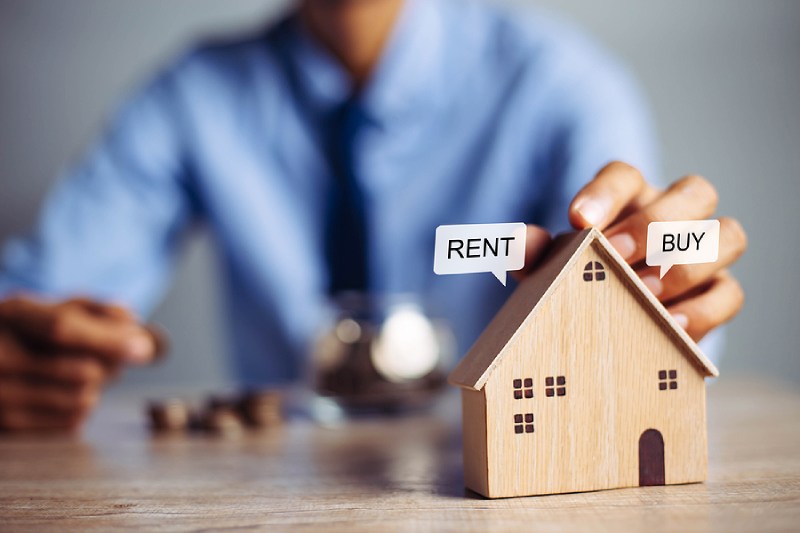Real Estate
Which Is Better For You, Purchasing or Renting A Home?

Determining whether to buy or rent is an interesting decision right now. Two-thirds of Americans are homeowners, with the national homeownership rate in the fourth quarter of 2023 being 65.7%, according to the U.S. Census Bureau. Encouraged by record-low mortgage rates, it felt at times during the previous few years like the entire other third of the population was racing to become homeowners.
But now that rates have increased considerably, housing costs are now very high. Many are opting to wait out the market instead of purchasing because they cannot afford the high rates and prices. Rents, however, are not always so inexpensive, particularly in well-known markets. How ought one to proceed? Before choosing, take into account the benefits and drawbacks of renting vs buying a home.
Pros and Drawbacks of Renting Versus Buying A Home
Purchasing
Advantages
- Increases Equity
- Increases credit
- Not having a landlord to answer to
- Increased steadiness
- Potential tax advantages
- Can remodel, enhance, or decorate a house to suit your tastes
Cons
- Requires a sizable upfront payment
- Could lose money if house values drop
- Extra costs incurred in addition to mortgage payments
- Low availability and rising property prices in several markets
- In charge of covering the price of maintenance and repairs
Rental
Advantages
- Less paperwork and up-front expenses
- The ability to move about more freely
- Not in charge of upkeep or repairs
- Falling home values are not a concern.
- Increases credit (if your landlord notifies the credit bureaus of your rent payments)
- No real estate taxes to pay
Cons
- Rent could be increased by the landlord
- May need to move quickly in the event that the landlord decides to sell the property
- increases the landlord’s equity, not yours
- Few openings in markets for rentals that are competitive
- No tax advantages
- Fewer options for design (appliances, paint colors)
Is Renting Truly Less Expensive Than Buying?
The prices of renting vs buying a property are mostly determined by your location and the state of the housing market.
Many people find the freedom of not needing a down payment or mortgage when renting to be appealing. However, the majority of rental homes do need a security deposit; when you sign a lease, you’ll typically be required to pay the first and last months’ rent.
Ask whether utilities like gas, electricity, water, and internet are included in your monthly rent when assessing a lease agreement. Ask about the security deposit’s retention period and interest rate as well.
The down payment is one of the largest expenses for prospective homeowners and can be a major barrier to becoming a homeowner. Monthly mortgage payments are another significant one. If your interest rate is variable, this could change over time and include both the loan’s principle and interest. Your mortgage payment may fluctuate in response to changes in property taxes and homeowners insurance rates, which are also taken into account.
In most cases, your lender will need you to acquire private mortgage insurance (PMI), which raises your monthly payment, if your down payment is less than 20% of the purchase price of the home. A smaller down payment may also result in a higher interest rate. Monthly HOA dues must also be considered if you’re buying a property in a homeowners association, or HOA. Additionally, homeowners are responsible for paying for routine maintenance and repairs.
For First-time Homes, Renting Is Far Less Expensive
In all 50 metro markets measured by Realtor.com’s February 2024 Rental Report, renting a starter home—defined here as one with two bedrooms or less—is now less expensive than buying one, up from 45 of the 50 cities in February 2023. According to its research, buying a starter home was somewhat more expensive than renting one, at a monthly cost of $1,027. In fact, the average monthly mortgage payment was 95.6 percent more in the top 10 cities where renting was preferred over owning.
Additional Distinctions Between Renting and Owning
Choosing to buy a home versus rent can be influenced by both financial and lifestyle factors. When you rent, you are released from long-term obligations. Conversely, having a home can provide one a sense of security and belonging. Here are a few more significant variations between the two choices.
Creating Equitable
Even while purchasing a house for habitation shouldn’t be treated only as an investment, purchasers can profit from the equity that builds up over time. You’ll get more money when you sell your house if its value increases. Additionally, you won’t have to worry about fluctuating monthly payments as you could with rising rent if you choose a fixed-rate mortgage.
Buying a house is a significant commitment, and you probably won’t immediately build up a sizable equity. In actuality, it usually takes a few years to recover your closing expenses and realize any equity gains.
Tax Ramifications
Potential tax benefits are another thing to think about for potential buyers. You may be able to reduce your federal tax obligation if you itemize deductions and claim the mortgage interest deduction.
However, since your rent may wind up being the same or less than the after-tax cost of homeownership, deductions shouldn’t be the only consideration. Property taxes can be high and vary depending on your location and the assessed value of the house you purchase.
Upkeep Expenses
Over time, homes require upkeep and repairs, which are often the landlord’s expense when you rent a property. For example, the landlord is responsible for fixing an apartment’s refrigerator or HVAC system when it malfunctions.
However, you will be responsible for such expenses as a homeowner, and they can mount up quickly. Over time, you might not be able to commit to this degree of maintenance, even if you’re handy and intend to conduct your own upkeep. When determining whether you can afford to buy a property, take these expenses into account. Additionally, make sure to undergo a home inspection so you can be aware of any potential red flags.
Requirements for Insurance
Although homeowners insurance is not required by federal or state law, it is usually required by mortgage lenders when you purchase a property. You might also need to have supplementary coverage for earthquakes or floods, depending on where you reside. The cost of home insurance can be very high, particularly in places that frequently experience extreme weather (like Florida, which is currently facing a home insurance crisis).
Renters insurance is a wise choice for tenants as it provides liability protection as well as theft and fire protection for personal belongings. Compared to homeowners insurance, renters insurance is significantly more affordable.
Is It Better To Buy or Rent? Seven Important Queries
There is no simple solution to the rent vs. buy argument. Renting can be a fantastic alternative if you are relocating to a new location, have an unpredictable career position, or are unsure of what neighborhood would feel like home. It’s crucial to assess how much your present living circumstances is likely to change in the near future. However, purchasing is perhaps a better choice if you want to settle down and establish some roots. When deciding whether to buy or rent, ask yourself these seven crucial questions:
- What is the monthly cost of housing that I can afford?
- Are I ready to commit to a long-term project?
- How much time do I intend to spend in this house?
- Which do I want: flexibility or stability?
- Can I afford the cost of home maintenance and repairs?
- What are my goals for my family, work, and finances? (For instance, are you going to move for work? Return to your studies? Grow your family larger?)
- Is it possible to become a homeowner in my dream neighborhood, or should I broaden my search?
In Summary
Selecting between renting and buying a home is a decision that takes into account personal circumstances and long-term financial goals in addition to cost. A local real estate agent with extensive knowledge of your market may be able to provide guidance if you’re unsure which is best for you. You can assess your options and come to a more informed decision with the assistance of a seasoned agent.
-

 Gadget4 weeks ago
Gadget4 weeks agoAfter Grand Success on BLDC Ceiling Fan, Eff4 Is Launching Smart Bulb
-

 Festivals & Events4 weeks ago
Festivals & Events4 weeks agoGoogle Celebrates Cherry Blossom Season with Animated Doodle
-

 Business2 weeks ago
Business2 weeks agoPrakash and Kamal Hinduja: Driving Social and Environmental Change
-
Education3 weeks ago
Fred DuVal: University Leadership as a Critical Resource for Climate Change Research and Life-Saving Solutions
-

 Health2 weeks ago
Health2 weeks agoThe Hinduja Brothers Commitment to Global Health: Empowering Communities Across Borders
-

 Cryptocurrency3 weeks ago
Cryptocurrency3 weeks agoDesigned For The Masses: How Akasha (AK1111) Is Unlocking Crypto For The Next Billion Users
-

 Cryptocurrency3 weeks ago
Cryptocurrency3 weeks agoNexaglobal & Future World Token (FWT): Could This Be the Next Big Crypto Investment of 2025?
-

 Sports4 weeks ago
Sports4 weeks agoWomen’s NCAA Tournament 2025 Sweet 16: Full Schedule, Fixtures, Teams, Bracket, and How to Watch March Madness Basketball Match Live















